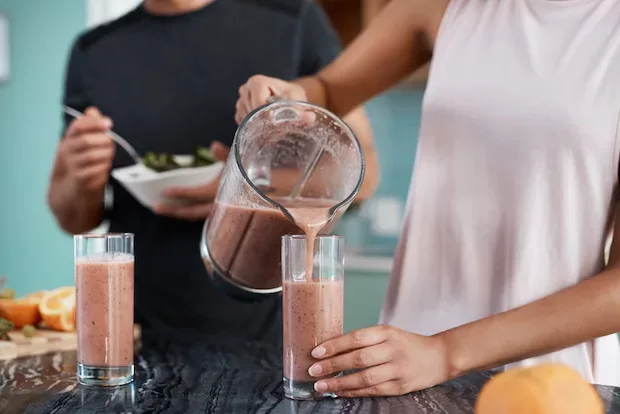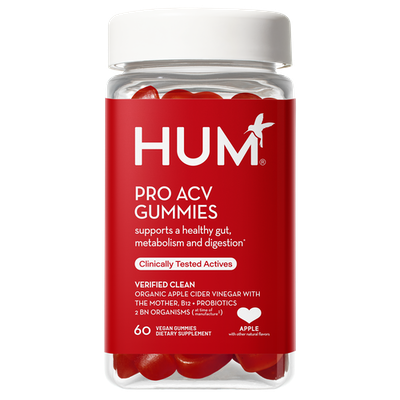Want to lose weight without losing your mind? Learn how to boost your metabolism so you can benefit from safe, sustainable weight loss—plus more energy and other wellness wins, to boot.
Weight loss is a tricky thing—both to discuss and to put into practice. All too often, quick fixes and fads enter the conversation, which can not only be ineffective but also dangerous at times. Crash diets and other drastic forms of restriction may provide short-term results, but their disadvantages will always outweigh any benefits. Instead, one of the best things you can do in your quest to lose weight is to boost your metabolism, which can help you burn more calories and keep weight off in the long run.
Ahead, we’ll cover what metabolism is exactly and what the benefits of high metabolism are. Plus: six expert-backed hacks to boost your metabolism that’ll help you reach your weight loss goals in a sustainable, healthy way.
What is metabolism?
Before we cover the top tips to boost metabolism, let’s first get clear on what metabolism is to begin with. “Metabolism is the rate at which your body breaks down foods, drinks, or stores of energy for a ready-to-use fuel source to power every process in the human body,” begins Taylor Fazio, MS, RD, CDN, a registered dietitian and wellness advisor at The Lanby in New York City.
She also provides a measurable definition of the term, explaining that metabolism can be viewed as a person’s daily total energy expenditure (TEE), which is governed by three major contributing factors:
- Your basal metabolic rate (BMR): the energy required for your body to function at rest
- Your activity level: exercise activity thermogenesis (EAT) and non-exercise activity thermogenesis (NEAT)
- The thermic effect of food metabolism (TEF): the energy it takes for your body to digest, absorb, and metabolize what you eat

Benefits of high metabolism
When your metabolism is high or fast, your body is naturally able to burn more calories, no matter whether you’re active or at rest. (Conversely, having low or slow metabolism means you’ll burn fewer calories, and you may thus be more susceptible to gaining weight.) Fazio explains that those with high metabolism have higher baseline energy requirements, “increasing the amount of intake required to meet energy needs.” As such, someone with high metabolism may need to eat more on a daily basis to keep their body energized and at peak function. Still, they’ll burn calories at a relatively rapid pace and are more likely to maintain (rather than gain) weight compared to someone with slower metabolism, so long as energy intake matches energy expenditure.
However, the perks of having fast metabolism aren’t limited to considerations around weight. High metabolism can also lead to having more energy throughout the day, as well as enjoying better sleep at night.
Key factors that affect your metabolism
According to Fazio, the primary factors that affect how fast or slow your metabolism is include:
- Genetics
- Age (but only to an extent, as metabolism remains stable from age 20 to 60 and declines by 0.7 percent annually thereafter)
- NEAT (the portion of daily energy expenditure from non-fitness related physical activity), which “is responsible for 6 to 10 percent of TEE in individuals with a mainly sedentary lifestyle and for 50 percent or more in highly active individuals”
- Lean body mass
As we can see, some aspects of metabolism are beyond a person’s control. But lifestyle factors can also sway it, for better (as we’ll see below) or for worse. For instance, Fazio shares that a history of yo-yo dieting can slow down metabolism due to metabolic adaptation. “When an individual lowers calories, the body responds by lowering NEAT and BMR in an attempt to protect from starvation,” she explains. “The chronic oscillation between extreme calorie deficit and then rebound overconsumption can potentially result in lower BMR and NEAT—even during times of adequate calorie intake.”
Simply put, severe restriction may lead to short-term weight loss—but it’s neither safe nor sustainable, and it can actually result in a slower metabolism (and thus a greater likelihood of weight gain) down the line.

6 hacks to boost your metabolism
Once you know how to boost your metabolism, you’ll be better equipped to lose weight in a healthy and sustainable manner—all the while enjoying key benefits of high metabolism like more energy, better sleep, and other markers of good health.
Without further ado, here are some of the best (and expert-approved) hacks to boost your metabolism:
- Create a slight calorie deficit. Yes, we just covered that calorie restriction can negatively impact your metabolism—but that’s when it’s severely restrictive. The operative word for this tip is slight. “An individual’s calorie needs vary widely. For someone aiming to lose weight, there is a threshold in which they should create a deficit and prevent going below their basal metabolic rate,” Fazio explains. The ideal amount of calories to cut will vary from person to person—and it may take some trial and error to figure out your sweet spot—so it may be worth enlisting the help of a registered dietitian.
- Try out intermittent fasting (IF). Intermittent fasting holds promise to improve longevity and healthspan, promote weight loss, and ramp up metabolism (among other benefits). One small 2019 study found that 34 to 58 hours of fasting “induced metabolic activation rather actively” and even indicated possible anti-aging effects. However, shorter fasts of at least 12 hours permit the body to switch into fat-burning metabolism—not to mention they’ll likely be easier to stick to, especially for those who are new to IF. (It bears repeating that intermittent fasting restricts when you eat more than what you eat. Always prioritize getting in vital nutrients and whole foods during your eating windows.)
- Balance your gut and take probiotics. The state of your gut indicates so much about your health status—including but not limited to your digestion, appetite, and weight. “Supporting the gut microbiome is important for a myriad of functions within the body. When clients optimize their gut health, they generally feel better and are motivated to avoid things that disrupt the gut and health in general,” says Fazio. But how does metabolism factor into the gut health equation? “By nature, [balancing the gut] can support metabolism because these mechanisms usually include physical activity and avoiding ultra-processed food,” she continues. Research also shows that gut bacteria have the ability to affect metabolism, which can influence weight loss (or gain). Other key hacks to optimize gut health—and thus positively impact metabolism—include managing stress, getting adequate rest, and taking a probiotic. (P.S. Call us biased, but we recommend opting for HUM’s PRO ACV gummies. They include a probiotic strain that helps to populate the gut microbiome, vitamin B12 to support cellular energy production, and apple cider vinegar—the last of which is shown to support metabolism, as well.)
- Spice things up with cinnamon. Too many diets prioritize what to take away instead of what to add. But it turns out that even small additions, like spices, have the potential to boost your metabolism, burn fat, and combat weight gain. Per findings from a 2017 study, cinnamaldehyde (an essential oil that lends cinnamon its flavor) “improves metabolic health by acting directly on fat cells, or adipocytes, inducing them to start burning energy through a process called thermogenesis.” Consider integrating more of this warming spice to your drinks and dishes, whether in tea, on top of a latte, or over your morning oats.
- Get physical. There are countless benefits of physical fitness—with the potential to boost your metabolism and support weight loss among them. “Exercise is calorie demanding, which helps utilize stored forms of energy to perform the activity. Exercise has also been seen to support hunger-fullness hormones, which in turn supports consuming satiating portions of food without over-consuming,” Fazio shares. The Physical Activity Guidelines for Americans offers various recommendations for exercise based on the type of exercise (e.g., cardio vs. strength training) and level of intensity. However, a small 2022 study in healthy, active men shows that high-intensity interval training (HIIT) may be particularly beneficial in boosting metabolism, so it may be worth trying out this protocol if your current workout regimen isn’t supporting your weight loss goals. “HIIT is an energetically demanding form of exercise which has been seen to increase calorie burn (by about 200 calories) for several hours after activity,” Fazio adds.
- Sleep well—and on a regular schedule. Consistent, high-quality sleep is key for everything from staying alert and energized to managing your mood and appetite. Research also shows that a lack of quality sleep (whether from a few days of poor shut-eye or routine deviations from your natural circadian rhythms) can disrupt metabolism, so catch your ZZZ’s night after night to boost your metabolism and improve your wellness game at large. “Optimizing sleep is extremely important for overall health, including weight loss,” Fazio explains. Moreover, she explains that poor sleep can contribute to increased insulin levels, more visceral fat, and systemic inflammation—all of which point to adverse effects for your weight and greater health.









